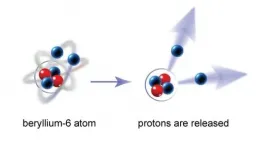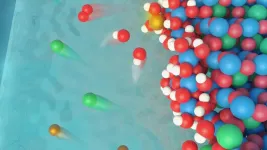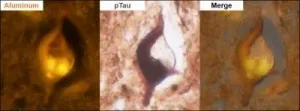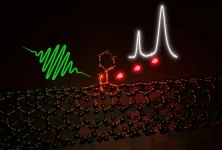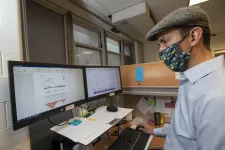(Press-News.org) Michigan State University's Witold Nazarewicz has a simple way to describe the complex work he does at the Facility for Rare Isotope Beams (frib.msu.edu), or FRIB.
"I study theoretical nuclear physics," said Nazarewicz, John A. Hannah Distinguished Professor of Physics and chief scientist at FRIB. "Nuclear theorists want to know what makes the nucleus tick."
There is a nucleus in every atom. Atoms, in turn, make up matter -- the stuff we interact with every day. But the nucleus is still shrouded in mystery. One of FRIB's goals in creating rare isotopes, or different forms of elements, is to better understand what's going on inside the cores of atoms.
In a new paper for END
Learning what makes the nucleus tick
Two FRIB researchers create computer model to help explain and make nuclear discoveries
2021-04-09
ELSE PRESS RELEASES FROM THIS DATE:
Sales of sugar sweetened beverages decline after SA introduces Health Promotion Levy - study
2021-04-09
Led by a South African team at the South African Medical Research Council Centre for Health Economics and Decision Science (PRICELESS-SA) in the School of Public Health at the University of the Witwatersrand, Johannesburg (Wits), and the University of the Western Cape, in partnership with the University of North Carolina, USA, the study was published on 8 April in The Lancet Planetary Health.
South Africa faces an increasing burden of non-communicable diseases (NCDs) such as diabetes, hypertension, cardiovascular disease and cancers - diseases that can be linked to increased consumption of sugar, particularly ...
Better solutions for making hydrogen may lie just at the surface
2021-04-09
A clean energy future propelled by hydrogen fuel depends on figuring out how to reliably and efficiently split water. That's because, even though hydrogen is abundant, it must be derived from another substance that contains it -- and today, that substance is often methane gas. Scientists are seeking ways to isolate this energy-carrying element without using fossil fuels. That would pave the way for hydrogen-fueled cars, for example, that emit only water and warm air at the tailpipe.
Water, or H2O, unites hydrogen and oxygen. Hydrogen atoms in the form of molecular hydrogen must be separated out from this compound. That process depends on a key -- but often slow -- step: the oxygen evolution reaction (OER). The OER is what frees up molecular ...
Aluminum is intricately associated with the neuropathology of familial Alzheimer's disease
2021-04-09
Amsterdam, April 9, 2021 -- This study builds upon two earlier published studies (Mold et al., 2020, Journal of Alzheimer's Disease Reports) from the same group. The new data, also published in the Journal of Alzheimer's Disease Reports, demonstrate that aluminum is co-located with phosphorylated tau protein, present as tangles within neurons in the brains of early-onset or familial Alzheimer's disease (AD). "The presence of these tangles is associated with neuronal cell death, and observations of aluminum in these tangles may highlight a role for aluminum in their formation," explained lead investigator Matthew John Mold, PhD, Birchall Centre, Lennard-Jones ...
Optically active defects improve carbon nanotubes
2021-04-09
The properties of carbon-based nanomaterials can be altered and engineered through the deliberate introduction of certain structural "imperfections" or defects. The challenge, however, is to control the number and type of these defects. In the case of carbon nanotubes - microscopically small tubular compounds that emit light in the near-infrared - chemists and materials scientists at Heidelberg University led by Prof. Dr Jana Zaumseil have now demonstrated a new reaction pathway to enable such defect control. It results in specific optically active defects - so-called sp3 defects - which are more luminescent and can emit single photons, that is, particles of light. The efficient ...
Using genetics, researchers identify potential drugs for early treatment of COVID-19
2021-04-09
A new study using human genetics suggests researchers should prioritize clinical trials of drugs that target two proteins to manage COVID-19 in its early stages.
The findings appeared online in the journal Nature Medicine in March 2021.
Based on their analyses, the researchers are calling for prioritizing clinical trials of drugs targeting the proteins IFNAR2 and ACE2. The goal is to identify existing drugs, either FDA-approved or in clinical development for other conditions, that can be repurposed for the early management of COVID-19. Doing so, they say, will help keep people with the virus from being hospitalized.
IFNAR2 is the target ...
Stress from work and social interactions put women at higher coronary heart disease risk
2021-04-09
PHILADELPHIA - Psychosocial stress - typically resulting from difficulty coping with challenging environments - may work synergistically to put women at significantly higher risk of developing coronary heart disease, according to a study by researchers at Drexel University's Dornsife School of Public Health, recently published in the Journal of the American Heart Association.
The study specifically suggests that the effects of job strain and social strain -- the negative aspect of social relationships -- on women is a powerful one-two punch. Together they are associated with a 21% higher risk of developing coronary heart disease. Job strain ...
Computer model fosters potential improvements to 'bionic eye' technology
2021-04-09
There are millions of people who face the loss of their eyesight from degenerative eye diseases. The genetic disorder retinitis pigmentosa alone affects 1 in 4,000 people worldwide.
Today, there is technology available to offer partial eyesight to people with that syndrome. The Argus II, the world's first retinal prosthesis, reproduces some functions of a part of the eye essential to vision, to allow users to perceive movement and shapes.
While the field of retinal prostheses is still in its infancy, for hundreds of users around the globe, the "bionic eye" enriches the way they interact with the world on a daily basis. For instance, seeing outlines of objects enables them to move around unfamiliar environments with increased safety.
That is ...
New biosealant can stabilize cartilage, promote healing after injury
2021-04-09
A new biosealant therapy may help to stabilize injuries that cause cartilage to break down, paving the way for a future fix or - even better - begin working right away with new cells to enhance healing, according to a new animal-based study by researchers at the Perelman School of Medicine at the University of Pennsylvania. Their research was published in Advanced Healthcare Materials.
"Our research shows that using our hyaluronic acid hydrogel system at least temporarily stops cartilage degeneration that commonly occurs after injury and causes pain in joints," said the study's senior author, Robert Mauck, PhD, a professor of Orthopaedic Surgery and the director of Penn Medicine's McKay Orthopaedic Research Laboratory. "In addition to pausing cartilage breakdown, we think that applying ...
New research on why 'poo' transplants effectively treat C. diff
2021-04-09
Experts have uncovered a new molecular reason why faecal transplants are highly effective in treating infections such as C. difficile (a nasty bacteria that can infect the bowel), which could lead to more targeted treatments for this and other similar diseases.
The study, published today in Gastroenterology, was led by experts from the University of Nottingham and Nottingham Trent University.
Clostridium difficile, also known as C. difficile or C. diff, is a bacterium that can infect the bowel and cause diarrhoea. The infection most commonly affects people who have recently been treated with antibiotics. It can spread easily to others.
A stool transplant - or to give it its full title "a faecal ...
Genes and immune cells predict immunotherapy success in bladder cancer
2021-04-09
New York, NY (April 9, 2021) - Sets of genes associated with resistance to immunotherapy in patients with metastatic urothelial cancer of the bladder have been identified and validated by researchers at Mount Sinai. In a study published in Clinical Cancer Research, the team uncovered gene signatures representing adaptive immunity and pro-tumorigenic inflammation that were responsible for sensitivity or resistance to immune checkpoint inhibitors, drugs that help the body's immune system recognize and attack cancerous cells.
"These findings enabled us to identify potential biomarkers in patients who are less likely to respond favorably to immune checkpoint inhibitors, as well as new combination therapeutic approaches that might overcome such resistance ...
LAST 30 PRESS RELEASES:
Don’t Panic: ‘Humanity’s Last Exam’ has begun
A robust new telecom qubit in silicon
Vertebrate paleontology has a numbers problem. Computer vision can help
Reinforced enzyme expression drives high production of durable lactate-based polyester
In Rett syndrome, leaky brain blood vessels traced to microRNA
Scientists sharpen genetic maps to help pinpoint DNA changes that influence human health traits and disease risk
AI, monkey brains, and the virtue of small thinking
Firearm mortality and equitable access to trauma care in Chicago
Worldwide radiation dose in coronary artery disease diagnostic imaging
Heat and pregnancy
Superagers’ brains have a ‘resilience signature,’ and it’s all about neuron growth
New research sheds light on why eczema so often begins in childhood
Small models, big insights into vision
Finding new ways to kill bacteria
An endangered natural pharmacy hidden in coral reefs
The Frontiers of Knowledge Award goes to Charles Manski for incorporating uncertainty into economic research and its application to public policy analysis
Walter Koroshetz joins Dana Foundation as senior advisor
Next-generation CAR-T designs that could transform cancer treatment
As health care goes digital, patients are being left behind
A clinicopathologic analysis of 740 endometrial polyps: risk of premalignant changes and malignancy
Gibson Oncology, NIH to begin Phase 2 trials of LMP744 for treatment of first-time recurrent glioblastoma
Researchers develop a high-efficiency photocatalyst using iron instead of rare metals
Study finds no evidence of persistent tick-borne infection in people who link chronic illness to ticks
New system tracks blockchain money laundering faster and more accurately
In vitro antibacterial activity of crude extracts from Tithonia diversifolia (asteraceae) and Solanum torvum (solanaceae) against selected shigella species
Qiliang (Andy) Ding, PhD, named recipient of the 2026 ACMG Foundation Rising Scholar Trainee Award
Heat-free gas sensing: LED-driven electronic nose technology enhances multi-gas detection
Women more likely to choose wine from female winemakers
E-waste chemicals are appearing in dolphins and porpoises
Researchers warn: opioids aren’t effective for many acute pain conditions
[Press-News.org] Learning what makes the nucleus tickTwo FRIB researchers create computer model to help explain and make nuclear discoveries
